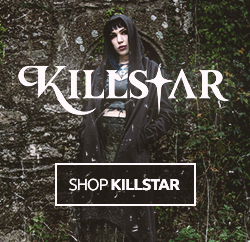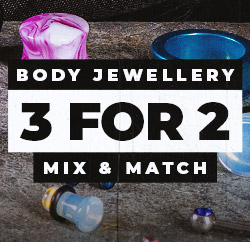Are you sure you want to perform this action?

GBP
Select Language
English (United Kingdom)
English (United States)
French (France)
German (Germany)
Italian (Italy)
Spanish (Spain)
Show menu
Hide menu
Clothing
Dresses
Hoodies & Sweatshirts
Jackets & Coats
Jumpers & Cardigans
Pinafores & Dungarees
Shirts & Tops
Jeans & Trousers
Skirts
T Shirts & Vests
View All
Autumn & Winter
Gothic
Kawaii
Spring & Summer
Steampunk
Tartan
TV & Movie Merch
Vintage
Witchy
View All
Gifts & Accessories
Band Merch Gifts
Bath Bombs
Fantasy Gifts
Gothic Gifts
Piercing & In-Store Voucher
Gothic Hair Accessories
Pop Culture Gifts
Stocking Fillers
Xmas Tree Decorations
View All
Band Merch
Hair Dye
Piercing Jewellery
Acrylic
Black Titanium
Coloured Titanium
Opal
Polished Titanium
Plasma Gold
Real Gold
Rose Gold
Silicone
Surgical Steel
Ultra Violet
White Gold
Wood
View All
Auricle
Anti-Tragus
Conch
Daith
Forward Helix
Helix
Industrial / Scaffold
Lobes
Orbital
Pinna
Rook
Scapha / Flat
Snug / Anti-Helix
Spiral / Triple Helix
Stretching
Tragus
View All
Angel Bites
Ashley
Canine Bites
Cyber Bites
Dahlia Bites
Dolphin Bites
Jestrum
Labret
Madonna
Medusa
Monroe
Shark Bites
Snake Bites
Spider Bites
Vertical Labret
Viper Bites
View All
Collarbone
Extreme Mods
Female Genital
Genital
Hand
Hip
Male Genital
Navel
Neck (Nape)
Nipple
Sternum / Cleavage
Surface
Wrist
View All
Contact Lenses
Get Pierced
Aftercare Guide
Ear Piercing Aftercare
Nose Piercing Aftercare
Oral Piercing Aftercare
Surface Piercing Aftercare
Microdermal Piercing Aftercare
Genital Piercing Aftercare
Aftercare
|
Body Piercing Jewellery
|
Types of Piercing
|
Surface Piercing Jewellery
|
Collarbone Surface Piercing Jewellery











